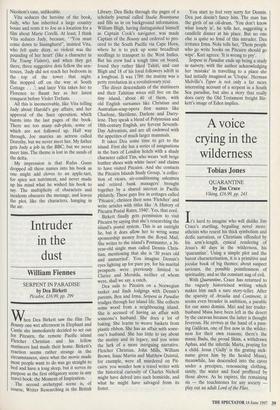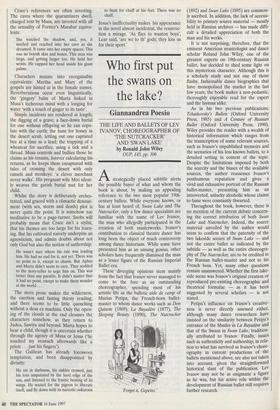A voice crying in the wilderness
Tobias Jones
QUARANTINE by Jim Crace Viking, £16.99, pp. 243 It's hard to imagine who will dislike Jim Crace's startling, beguiling novel more: atheists who resent his thick symbolism and deific narration, or Christians offended by his arm's-length, cynical rendering of Jesus's 40 days in the wilderness, his `quarantine'. Using a simple plot and the barest characterisation, it is a primitive and jocular book of big themes: about suspect saviours, the possible pointlessness of spirituality, and so the constant nag of evil.
With Quarantine, Crace has returned to the vaguely historicised writing which makes him such a sure story-teller. After the sparsity of Arcadia and Continent, it seems even broader in ambition, a parable for our anno domini. Miri and her trader- husband Musa have been left in the desert by the caravan because the latter is thought feverous. He revives at the hand of a pass- ing Galilean, one of five now in the wilder- ness for their own reasons; there's the manic Badu, the proud Shim, a withdrawn Aphas, and the infertile Marta, praying for a child. Jesus (`Gally' is the grating nick- name given him by the healed Musa), meanwhile, has descended into the caves under a precipice, renouncing clothing, sanity, the water and food proffered by those above. As he expires, the remaining six — the touchstones for any society play out an adult Lord of the Flies. Crace's references are often arresting. The caves where the quarantiners dwell, charged rent by Musa, are invested with all the sexuality of Forster's Marabar equiva- lents:
She watched the shadow, and, yes, it swelled and reached into her cave as she dreamed. It came into her empty spaces. This was no boyish skin and bones. This man was large, and getting larger too. He held her wrists. He cupped her head inside his giant palms.
Characters mutate into recognisable equivalents: Martha and Mary of the gospels are hinted at in the female names. Reverberations occur even linguistically, the 'gingery' balm of Marta linked in Musa's lecherous mind with a longing for water 'with a touch of ginger to its taste'.
Simple incidents are rendered at length; the digging of a grave, a face-down burial for one without offspring so he can copu- late with the earth; the hunt for honey in the desert scrub, letting out one captured bee at a time as a lead; the trapping of a wheatear for sacrifice, using a tick and a thread. Musa controls and bullies those he claims as his tenants, forever calculating his returns, as he keeps them enraptured with tales of crossing the desert with only camels and monkeys: 'a clever merchant never walks'. His pregnant wife Miri silent- ly weaves the garish burial mat for her child.
Whilst the story is deliberately orches- trated, and graced with a climactic denoue- ment (with sex, storm and death) plot is never quite the point. It is somehow too meditative to be a page-turner. Snobs will probably moan that Crace isn't a stylist, that his themes are too large for his learn- ing. But his cultivated naivety underpins an agnosticism, and admits doubts about not only God but also the notion of authorship:
He wasn't sure where his tale was leading him. He had no end for it, not yet. There was no point to it, except to charm. But Aphas and Marta didn't seem to care. They nodded to the story-teller to urge him on. This was better than any parable. It didn't matter that it had no point, except to make them wonder at the world . . .
The stern prose makes the wilderness, the exertion and fasting thirsty reading; and there seems to be little quenching without a deus ex machina. Only the open- ing of the clouds at the end cleanses the characters somehow, as they return to Judea, Sawiya and beyond. Marta hopes to bear a child, though it is uncertain whether through the agency of Musa or Jesus (`he touched my stomach afterwards like a priest . . . just his fingers').
The Galilean has already foresworn temptation, and been disappointed by divinity: He sat in darkness, his ankles crossed, just his toes amputated by the hard edge of the sun, and listened to the frantic beating of its wings. He waited for the pigeon to liberate itself, and fly down with its narcotic ookuroos
to hunt for chaff at his feet. There was no chaff.
Jesus's ineffectuality makes his appearance in the novel almost incidental, the resurrec- tion a mirage. 'As flies to wanton boys', Lear said, 'are we to th' gods; they kiss us for their sport.'











































































 Previous page
Previous page